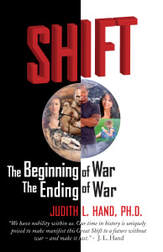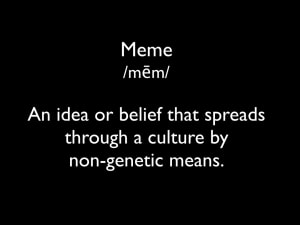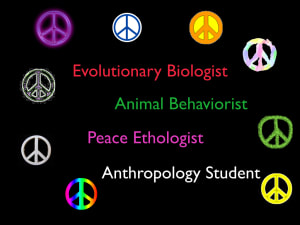- Home
-
Overview
- Study Guide
- The Single Most Important Idea
- Mission Statement
- War Is Not Inevitable keynote speech
- Capstone Essay: "To Abolish War"
- An Action Plan
- The Nine Cornerstones
- How Far We Have Already Come
- The Secret Ingredient
- The Vision Thing
- How Long It Will Take
- What You Can Do
- The AFWW Logo Explained
- Examples of War Expenses
- Biological Differences
- What Makes People Happy
- Map of Non-warring Cultures
- Cornerstones
- Videos
- Books
- Blog
- Project Enduring Peace
- About
- Related Projects
- Contact
|
by Judith Hand A meme can be an idea or belief that spreads throughout a culture by non-genetic means. This essay is about an idea powerful enough to radically transform human history. If this meme spreads across the globe by word of mouth and social media and captures the minds of a critical mass of global citizens and powerful movers-and-shakers, it can usher in a social paradigm shift every bit as profound as the Agricultural, Industrial, and Digital Revolutions. Have you ever wondered what the future will look like? For you? Or maybe for the future’s children or grandchildren? Specifically, do you fear it will be forever blighted by war? Let’s start with a little survey, asking two questions. First, do you think it’s possible humans can build a permanent base on the Moon? Here’s question two: Based on your life experience, do you think it’s possible that we could end war? This isn’t “would you like us to end war?” Rather it’s “Do you believe it is, in fact possible?” Not a lot of rational thought, please…just, what is your first, gut response? Most people believe that putting a base on the moon is a possibility. In contrast, the vast majority of people asked these questions say they don’t believe ending war is possible. So, if you’re a skeptic about ending war, you absolutely aren’t alone. The Single Biggest Barrier to Ending War: The Vast Majority of People Don't Believe It's Possible! If We Don't Believe It's Possible, Then It Isn't Possible. This skepticism, that we can’t end war, is the single biggest barrier to doing it. We can’t accomplish any great feat, including putting a permanent colony on the Moon, if we start out “knowing” that it’s not possible. Great feats are accomplishd when at least one person has the vision of something and the belief that it can be done, one way or the other. Keep an open mind, and hopefully what follows will convince you that the answer to whether or not we can abolish war is “yes. It IS possible.” I’ll mention later how I was drawn into the study of war, but my background prepared me for it in several ways. I’m an evolutionary biologist, with a Ph.D. from UCLA. What’s relevant to the study of war is that my areas of specialization are in communication, conflict resolution, gender differences, and primate behavior (including human behavior). The fancy name for the study of animal behavior is “ethology.” Since I’ve been studying war and peace from this perspective for the last 15 or so years, I’m am now also officially a Peace Ethologist. Additionally, as an undergraduate major in cultural anthropology, I studied non-patriarchal and nonviolent cultures.  I put the results of my work on war and peace into this book. Also relevant is that I’m a published novelist, which I mention briefly later. Lest we wander astray into other aspects of human lethal behavior, WAR needs to be defined as I use it. Murder is not war. Revenge killings of specific individuals, if you will, feuding over particular grievances, is not war. War is when people (overwhelmingly men) band together to indiscriminately kill people in another group and the community’s noncombatants and religious leaders sanction their actions. It’s the sanctioned banding together to kill indiscriminately that distinguishes war from other forms of killing. We’re NOT going to erase murder and revenge anytime soon…these go way way back into human experience, maybe even before we became humans. We’re only considering the potential to abolish war.  Now imagine a Star Trek Future. In the TV show’s first year or so we were never on Earth. But what we knew about the Starship Enterprise’s crew was that on their home world there was no money, no poverty, and no war. They were clearly using their resources to invent and do fabulous things, like mounting starships to explore the galaxy. What we’re considering is whether that kind of Gene Roddenberry vision of an amazing and positive Homo sapiens future is completely out of the question? Although we’ll be exploring the potential for a positive future, what is presented here is presented against the backdrop of the belief of many that it’s entirely possible onrushing violent movements like ISIS, or a mistaken triggering of a nuclear war, or some totally unpredictable event like a global pandemic could plunge us into a new “dark age” or “Mad Max” future of perpetual war. We are arguably in a race against time and possible misfortune. To stop what we don’t want and build what we do, realism, not wishful thinking, is required. So we’ll be seeking enlightenment and examining positive potential, with the understanding that nothing is guaranteed. Six kinds of evidence are presented to support the view that we can end war:
1 Comment
|
Follow Me on Facebook
If you'd like to read my take on current affairs, or get a sense of what amuses me or I find educational or beautiful, do a search and follow me, Judith Hand, on Facebook. About the AuthorDr. Judith L. Hand. Dr. Hand earned her Ph.D. in biology from UCLA. Her studies included animal behavior and primatology. After completing a Smithsonian Post-doctoral Fellowship at the National Zoo in Washington, D.C., she returned to UCLA as a research associate and lecturer. Her undergraduate major was in cultural anthropology. She worked as a technician in neurophysiology laboratories at UCLA and the Max Planck Institute, in Munich, Germany. As a student of animal communication, she is the author of several books and scientific papers on the subject of social conflict resolution.
Categories
All
Archives
November 2019
|
A Future Without War
Believe in it. Envision it. Work for it.
And we will achieve it.
Believe in it. Envision it. Work for it.
And we will achieve it.
AFWW is continually developed and maintained by Writer and Evolutionary Biologist Dr. Judith Hand.
Earth image courtesy of the Image Science & Analysis Laboratory, NASA Johnson Space Center. Photo Number AS17-148-22727 eol.jsc.nasa.gov
©2005-2019 A Future Without War. All rights reserved. Login
Earth image courtesy of the Image Science & Analysis Laboratory, NASA Johnson Space Center. Photo Number AS17-148-22727 eol.jsc.nasa.gov
©2005-2019 A Future Without War. All rights reserved. Login
- Home
-
Overview
- Study Guide
- The Single Most Important Idea
- Mission Statement
- War Is Not Inevitable keynote speech
- Capstone Essay: "To Abolish War"
- An Action Plan
- The Nine Cornerstones
- How Far We Have Already Come
- The Secret Ingredient
- The Vision Thing
- How Long It Will Take
- What You Can Do
- The AFWW Logo Explained
- Examples of War Expenses
- Biological Differences
- What Makes People Happy
- Map of Non-warring Cultures
- Cornerstones
- Videos
- Books
- Blog
- Project Enduring Peace
- About
- Related Projects
- Contact




 RSS Feed
RSS Feed